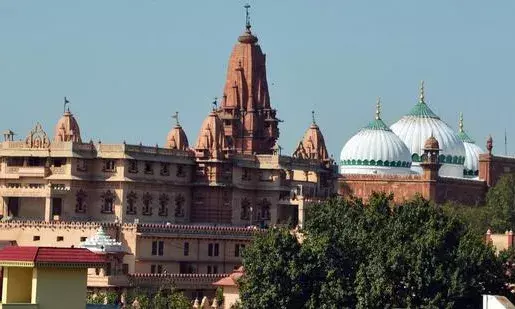Landmark Decision by Allahabad High Court in Sri Krishna Janmabhoomi-Shahi Idgah Case
Court to Hear 18 Hindu Petitions, Dismisses Muslim Parties' Objections;

Allahabad High Court has given an important decision in the famous Sri Krishna Janmabhoomi and Shahi Idgah case of Mathura. In this case, the Hindu side had filed 18 petitions and said that the land of Shahi Idgah Mosque belonged to Hindus. Along with this, the Hindu side also demanded the right to worship there.
After the petition of the Hindu side, the Muslim side demanded the dismissal of the petitions of the Hindu side citing the Places of Worship Act, Waqf Act, Limitation Act and Specific Possession Relief Act. But Allahabad High Court has rejected the petition of the Muslim side. That is, now 18 petitions of the Hindu side will be heard together in Allahabad High Court.
This decision has been given by a single bench of Justice Mayank Kumar Jain. In technical terms, Allahabad High Court rejected the application of the Muslim side objecting to Order 7 Rule 11. Because the Muslim side had challenged the maintainability of the petitions. That is, the hearing on the petitions of the Hindu side will continue.
What arguments did the Hindu parties give?
1. The entire two-and-a-half acre area of Idgah is the sanctum sanctorum of Lord Shri Krishna.
2. The mosque committee does not have any such record of the land.
3. Order-7, Rule-11 of CPC is not applicable in this petition.
4. The mosque has been constructed illegally by demolishing the temple.
5. The land is owned by Katra Keshav Dev.
6. Without ownership rights, the Waqf Board has declared this land as Waqf property without any legal process.
7. The building is also declared protected by the Archaeological Department, hence the Places of Worship Act does not apply to it.
8. ASI has considered it as Nazul land, it cannot be called Waqf property.
Muslim parties’ petitions rejected
1. The Muslim parties had argued in the court that an agreement was made between the two parties on this land in 1968. It is not right to call the agreement wrong after 60 years. Therefore, the case is not worth pursuing.
2. The case is not admissible under the Places of Worship Act 1991.
3. The identity and nature of the religious place will remain the same as it was on 15 August 1947. That is, its nature cannot be changed.
4. This matter should also be looked into under the Limitation Act and the Wakf Act.
5. This dispute should be heard in the Wakf Tribunal. This is not a case to be heard in a civil court.

